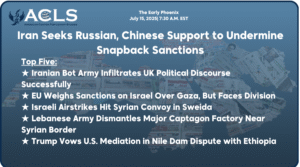In the Gulf, the Chinese-brokered deal between Iran and Saudi Arabia mainly addressed ending the war in Yemen, but it has also offered Assad his best political opportunity in years, especially after Russia, Turkey, and Iran essentially used their so-called Astana Group forum to steer the long-running UN-brokered political transition into a stalemate. The absence of the West as a counterweight in the Syrian political track has greatly benefited Assad, especially after the Biden administration, following the devastating February 6th earthquake, placed a six-month moratorium on sanctions on Assad’s financial sector. Across the Middle East, this move by the U.S. administration was interpreted as a green light for the normalization initiatives that have accelerated since then.
Nevertheless, the Chinese, Russian, and Iranian plans to gradually enforce the normalization and legitimacy of the Assad regime faced challenges last week after at least five Arab countries refused his return to the Arab League, this time because Assad refused to guarantee specific steps concerning humanitarian aid and refugees.
At virtually the same time, the Russian-brokered normalization efforts between Assad and Turkey also hit a snag, as Assad’s representatives demanded the first item of discussion to be the withdrawal of Turkish forces from northern Syria, a demand that angered the Turkish government. Russian foreign minister Sergei Sergei Lavrov had to travel to Turkey for two days to address the Turkish backlash following the initial meetings between the Turks and Assad’s representatives. Lavrov later announced that meetings between the Assad regime and Turkey should not be based on preconditions.
On April 13, Saudi foreign minister Faisal Bin Farhan hosted Faisal Miqdad, Assad’s foreign affairs minister, after twelve years of severed relations. The Kingdom’s decision to reopen relations with Assad came as part of a broader Saudi agenda of settling other regional accounts, as evidenced in the effort to end the war in Yemen. But the fact that Saudi officials seized 3.6 million smuggled Captagon pills on the same day Farhan hosted Miqdad raises questions about Riyadh’s ability to combat the narco-state that the Assad regime has become. The French newspaper Le Monde explained that it would not be difficult for Bashar al-Assad, who initiated terrorism in Syria and Iraq while simultaneously advertising himself to the world as the only bulwark against the terrorism he himself was conducting, to similarly delude the world into viewing him as indispensable in battling the drug trade that he himself is leading.
The joint Saudi-Assad statement issued during Miqdad’s visit signals that the normalization process between them is doomed to failure because “the necessary steps” discussed between the two to end Assad’s isolation are not only unfavorable to Assad but virtually impossible for him to achieve even if he were interested in doing so. Resolving the humanitarian siege on Syrian communities and providing the appropriate environment for aid to reach all regions, creating the conditions to enable the safe return of refugees, and taking more measures that would contribute to the stability of the entire country were some of the steps the Saudis discussed with Miqdad. However, resolving the humanitarian siege created by Russia’s vetoes at the United Nations Security Council would weaken Assad’s political leverage on Syrians who oppose his rule. Meanwhile, creating the conditions to enable the safe return of refugees would require billions of dollars in reconstruction costs, which the regime claims not to have, but more importantly, would require lifting the iron-grip killing machine the regime has imposed on Syria since 2011.
In reality, Assad gains more benefits and revenue from his Captagon cartel than Saudi Arabia and the other Arab states can ever provide as incentives, and therefore Assad has no interest in taking any of the measures the Arab capitals want him to take to contribute to the stability of Syria.
The leaked conversations among the Arab foreign ministers who met in Jeddah the day after Miqdad’s visit indicated that Arab officials who met with Assad and his entourage have come to this same conclusion. They reportedly said at the ministerial meeting that no benefit would come out of legitimizing “a Captagon Cartel government” that behaves as a predator while also coming close to demanding an “Arab apology” for having aided the Syrian opposition in the first place.
The joint statement issued at the end of the Arab foreign ministers meeting in Jedda reiterated that only a political solution is viable in Syria and called upon Assad to end the presence of armed militias and external interference in Syria’s internal affairs. The statement added that Assad must combat Captagon manufacturing and trafficking out of Syria. The fact that the joint statement of the Arab leaders’ meeting did not mention an agreement to invite Assad to the Arab League summit, which will take place in May, corroborates the leaked discussions between the attendees reported by the Financial Times.



